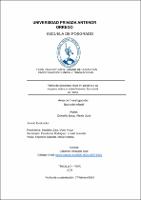| dc.contributor.advisor | Caballero Alvarado, José | |
| dc.contributor.author | Ormeño Julca, Alexis José | |
| dc.creator | Ormeño Julca, Alexis José | |
| dc.date.accessioned | 2024-04-03T19:56:29Z | |
| dc.date.available | 2024-04-03T19:56:29Z | |
| dc.date.issued | 2024 | |
| dc.identifier.uri | https://hdl.handle.net/20.500.12759/25851 | |
| dc.description.abstract | Objetivo: Determinar si el retiro de los alimentos ricos en pectina mejora el
estreñimiento funcional, en niños mayores de 4 años, atendidos por
gastroenterología pediátrica.
Material y Métodos: Estudio cuasi-experimental sin grupo control concurrente, que
incluyó todos los pacientes entre 4 y 14 años con estreñimiento funcional, atendidos
en un consultorio privado de gastroenterología pediátrica, entre junio del 2022 y
marzo del 2023. Para establecer el diagnóstico de estreñimiento funcional se usaron
los criterios de Roma IV y se excluyeron pacientes con comorbilidades digestivas
o tratamiento previo con laxantes. Se recolectaron en forma diaria datos sobre
consistencia de las heces, frecuencia defecatoria, dolor al defecar, flatulencia, y
perímetro abdominal, durante dos semanas sin dieta y 2 semanas luego de retirar
los alimentos ricos en pectina. Para el análisis se usó estadística descriptiva y la
prueba Test de rangos de Wilcoxon.
Resultados: Ingresaron 66 pacientes, con predominio femenino, y principalmente
provenientes de Chiclayo. El 51.5% fueron eutróficos, y dentro de las
complicaciones, el 60.6% presentó incontinencia fecal, el 48,5% impactación fecal
y el 47% fisura anal. Al retirar los alimentos ricos en pectina, no se halló diferencia
estadísticamente significativa en las variables de estudio (p > 0.05).
Conclusión: El retiro de los alimentos ricos en pectina no mejoró el estreñimiento
funcional en pacientes mayores de 4 años tratados con polietilenglicol sin
electrolitos atendidos por gastropediatría. | es_PE |
| dc.description.abstract | Objective: To determine whether the withdrawal of foods rich in pectin improves
functional constipation in children over 4 years of age, treated by pediatric
gastroenterology.
Material and Methods: Quasi-experimental study without a concurrent control
group, which included all patients between 4 and 14 years of age with functional
constipation, treated in a private pediatric gastroenterology office, between June
2022 and March 2023. To establish the diagnosis of functional constipation, Rome
IV criteria and patients with digestive comorbidities or previous treatment with
laxatives were excluded. Data on stool consistency, defecation frequency, pain
during defecation, flatulence, and abdominal circumference were collected daily for
two weeks without diet and 2 weeks after removing pectin-rich foods. Descriptive
statistics and the Wilcoxon Rank Test were used for the analysis.
Results: 66 patients were admitted, predominantly female, and mainly from
Chiclayo. 51.5% were eutrophic, and among the complications, 60.6% presented
fecal incontinence, 48.5% fecal impaction and 47% anal fissure. When foods rich
in pectin were removed, no statistically significant difference was found in the study
variables (p > 0.05).
Conclusion: Conclusion: The withdrawal of foods rich in pectin did not improve
functional constipation in patients over 4 years of age treated with polyethylene
glycol without electrolytes attended by gastropediatrics | es_PE |
| dc.description.uri | Tesis | es_PE |
| dc.format | application/pdf | es_PE |
| dc.language.iso | spa | es_PE |
| dc.publisher | Universidad Privada Antenor Orrego | es_PE |
| dc.relation.ispartofseries | D_ICT_023 | |
| dc.rights | info:eu-repo/semantics/openAccess | es_PE |
| dc.rights.uri | https://creativecommons.org/licenses/by/4.0/ | es_PE |
| dc.subject | Estreñimiento funcional | es_PE |
| dc.subject | Pectina | es_PE |
| dc.subject | Alimentos | es_PE |
| dc.title | Retiro de alimentos ricos en pectina y su impacto sobre el estreñimiento funcional en niños | es_PE |
| dc.type | info:eu-repo/semantics/doctoralThesis | es_PE |
| thesis.degree.grantor | Universidad Privada Antenor Orrego. Escuela de Postgrado | es_PE |
| thesis.degree.name | Doctor en Investigación Clínica y Transnacional | es_PE |
| thesis.degree.discipline | Doctorado | es_PE |
| dc.subject.ocde | http://purl.org/pe-repo/ocde/ford#3.02.27 | es_PE |
| renati.advisor.orcid | https://orcid.org/0000-0001-8297-6901 | es_PE |
| renati.author.dni | 25723524 | |
| renati.advisor.dni | 18886226 | |
| renati.type | http://purl.org/pe-repo/renati/type#tesis | es_PE |
| renati.level | http://purl.org/pe-repo/renati/level#doctor | es_PE |
| renati.discipline | 912048 | es_PE |
| renati.juror | Bardales Zuta, Víctor Hugo | |
| renati.juror | Fernández Rodríguez, Lissett Jeanette | |
| renati.juror | Espinoza Salcedo, María Victoria | |
| dc.publisher.country | PE | es_PE |




